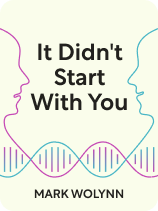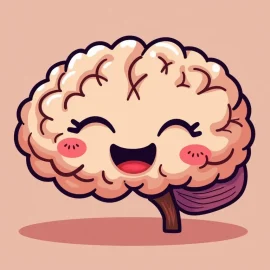

This article is an excerpt from the Shortform book guide to "It Didn't Start With You" by Mark Wolynn. Shortform has the world's best summaries and analyses of books you should be reading.
Like this article? Sign up for a free trial here .
Are you looking for It Didn’t Start With You quotes by Mark Wolynn? What does he have to say about inherited trauma?
In It Didn’t Start With You, Mark Wolynn says the source of your suffering may lie hidden in your unconscious, where traumas from your past—and your family’s past—are stopping you from being truly happy and free. Wolynn shares the latest research to reveal how traumas get passed biologically from one generation to the next.
Here’s a selection of quotes highlighting some of the key ideas.
It Didn’t Start With You Quotes
Do you suffer from persistent anxiety, depression, or illness? If you’ve tried and failed to get relief through talk therapy, medication, and lifestyle changes, you may need another approach. The source of your suffering may lie hidden in your unconscious, where traumas from your past—and your family’s past—are stopping you from achieving happiness, success, and freedom.
In It Didn’t Start With You, Mark Wolynn, director of The Family Constellation Institute, shares the latest research to reveal how traumas get passed biologically from one generation to the next. The secret to uncovering and resolving these traumas, Wolynn says, is language-based therapy—answering a series of personal questions and following the clues that surface in your responses.
Here are some of the top It Didn’t Start With You quotes by Mark Wolynn.
“When family members lead unhappy lives or suffer an extremely difficult fate, it’s often easier to reject them than to feel the pain of loving them. Anger is often an easier emotion to feel than sadness.”
Wolynn asserts that cutting ourselves off from parents who have caused us pain can give us the illusion of freedom, but doing so often blinds us to the ways we embody the very qualities in them we reject. Here’s an example: You cut ties with your father because he had an affair that led to your parents’ divorce. Now the unresolved pain and anger you directed at your father are surfacing in your life in unexpected ways—and you find yourself exhibiting the same qualities you rejected in him. You refuse to consider marriage, you are aloof with your partner who you love deeply, and—to your horror—you find yourself tempted to cheat on him.
(Shortform note: Research supports Wolynn’s assertion that parent-child relationships profoundly shape our lives, and that renouncing a parent can negatively impact your well-being. One study, for example, indicates that the psychological distance between family members influences our mental health outcomes. When relationships among mother, father, and children are all equal and close—what researchers consider “balanced”—children are less prone to anxiety and depression.)
“A child who takes care of a parent often forges a lifelong pattern of overextension and creates a blueprint for habitually feeling overwhelmed.”
Wolynn says it’s common for us to internalize a parent’s trauma and then project that trauma into our relationships. Here’s an example: If your mom suffers from severe social anxiety while you are growing up, she may isolate herself. To alleviate her loneliness, you step in as her friend and confidant. Now, as an adult, you are repeating that dynamic with your son while still serving as caretaker for your mother. You resent your mother and feel guilty about imposing on your son.
“By developing a relationship with the painful parts of ourselves—parts we have often inherited from our family—we have an opportunity to shift them. Qualities like cruelty can become the source of our kindness; our judgments can forge the foundation of our compassion.”
Wolynn recommends that you use insights about past grievances to mend broken relationships. You can do this even if your family members are deceased or if you don’t know where they are. Here are some options to do this:
- Have a conversation—either in your head or out loud—with your family member addressing their particular trauma: “I know you went through great pain when your husband died suddenly of a heart attack. I have been holding that pain, which has caused me to be needy and clingy in my relationship with my husband. I am surrendering this pain back to you now. Whenever I feel insecure in my relationship, I will breathe in your love and support.”
- Express gratitude toward a parent at a level that feels authentic to you, either privately or in conversation with them—whatever you can muster. For example, you could say, “I am grateful to you for giving me life,” or “I have rejected you and blamed you for a long time. Now I am choosing to be at peace.”
- Imagine your parent saying something loving to you: “I did things to hurt you and I am sorry. Please accept the love I have for you.”
Wolynn clarifies that healing these relationships doesn’t mean excusing a parent’s behavior or even necessarily resuming any kind of ongoing connection with a parent. Rather, he says, healing requires dropping the anger-filled, accusatory stories we have about our parents. Releasing those stories isn’t about giving up or giving in for the benefit of our parents. It’s about freeing ourselves so we can move forward.
“Sometimes, the heart must break in order to open.”
No matter what traumas lie in your past, Wolynn affirms that you can break the pattern of suffering. Sometimes, simply linking traumas that happened in your family history can alleviate your most intense symptoms. But usually, a one-time breakthrough is not enough.
To achieve true, sustained healing, you must develop practices tailored to your unique circumstances that bring forward soothing emotions and physical sensations. The practices you choose, Wolynn says, should move you at a deep emotional level—powerful enough to eclipse the old, restrictive emotions and patterns that have been interfering with your freedom. Whichever rituals or practices you choose, you must repeat them regularly to cement your insights and healing.

———End of Preview———
Like what you just read? Read the rest of the world's best book summary and analysis of Mark Wolynn's "It Didn't Start With You" at Shortform .
Here's what you'll find in our full It Didn't Start With You summary :
- A look into the causes of persistent anxiety, depression, and illness
- How the traumas of your past are stopping you from being truly happy and free
- How to resolve deeply-rooted trauma by applying a unique therapeutic approach






